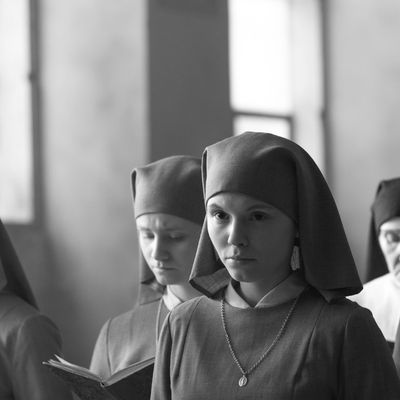
Broadly speaking a female coming-of-age saga, Pawel Pawlikowski’s Ida has an eerie luster — it’s a movie out of time. Its boxy, black-and-white palette is stark: Objects stand out like branches against a cold winter sky. The wordless opening shots suggest Dreyer or early Bergman. In a rural Polish convent in the early 1960s, a young orphan (Agata Trzebuchowska) called Anna prepares to take her vows. But first, says the Mother Superior, she has to meet her only relative, an aunt named Wanda (Agata Kulesza). It’s from Wanda she learns that her given name was “Ida.” And also that she’s Jewish.
Trzebuchowska resembles a young Mia Farrow — her wide-apart eyes seem fixed on some otherworldly realm. She’s frozen in beatitude. The news that she’s Jewish does not elicit much of an external reaction, so her aunt emotes for two. Wanda is a judge, but was not so long ago a widely feared Party prosecutor. She sent enemies of the socialist state to their deaths. She was known as “Red Wanda.” What caused her fall isn’t clear — maybe alcohol, maybe Jewishness, maybe that she’s a woman. The arrival of Ida offers her a last chance to grapple with her past. So the two women embark on a journey to find out what happened to — and what remains of — their family.
Pawlikowski left Poland at age 14. This is his first film in his native language. He’s a quarter Jewish — his grandfather died in a concentration camp — but Ida isn’t about rediscovering his Jewish heritage. Its theme is more general: confronting a past that’s out of sight but smells to heaven. He harbors no love for the Poles, who are depicted as coarse and dead-faced, who refuse even to acknowledge the memory of Ida and Wanda’s family. It’s a grim irony that the only way Wanda gets anywhere with them is by hauling out her scary totalitarian party affiliation. Between the Nazi past and Commie present, there’s nowhere a soul can be in peace, untroubled.
Pawlikowski’s style conveys much. Until the last minute, the camera is fixed in place. The feel is desolate, constricted. The characters’ heads are low in the frame. The space above their heads suggests a haunting indifference on the part of the universe. At one point, music almost fills the void: Wanda and Ida pick up a male hitchhiker — a very cute alto sax player in a traveling jazz band. It’s clear that the musician is kindling something in Ida that she has never felt before. Will she shake out her hair and get down? And when the journey ends, will she still want to be a bride of Christ?
Ida is barely 80 minutes and lacks fullness, and the style that’s so arresting can also seem studied. But the movie’s chill is hard to shake off. It’s a grimly potent portrait of repression, of what happens to a society that buries its past in an unmarked grave — and lives its present in a state of corrosive denial.


